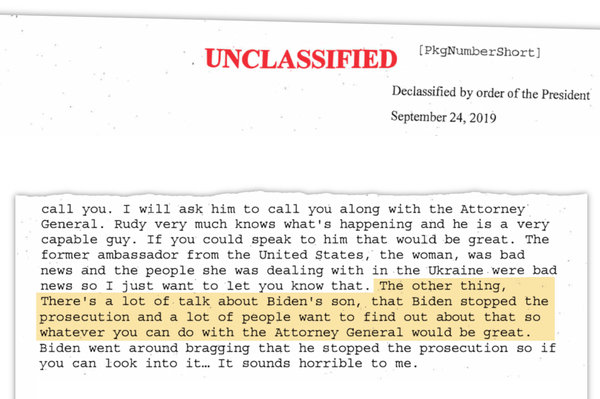Here’s some interesting background on what the term “transcript” really means when used to refer to a record of a presidential phone call. It’s actually a collection of notes taken by two or more note takers. It is not based on a tape. A source for this article states there are no known tapes of Trump’s phone calls.
The source also states that note takers tend to omit “issues that could be controversial.” WTF? Those are the very parts of any call that it would be most important to have a record of!
Excuse my cynicism, but I’m already suspicious about the provenance of the “transcript” Trump will be releasing. Are there various drafts of such a collection of notes? Are we getting the first draft or a later draft that may have been edited? The document released should contain a detailed description of how it was created and the history of any modifications.
This is why I’m glad that a formal impeachment inquiry has begun. It should give Congress more power to collect the information they need. For example, it may be necessary to subpoena the note takers who were on this call and question them regarding details of the call – especially if the transcript does not appear to be a comprehensive record.
Details from a phone call made by Donald Trump that has led the U.S. House of Representatives to launch a formal impeachment inquiry against the president isn’t likely to come from a recording or be verbatim, former White House and national security officials say.
Instead, because of standard White House protocol for handling phone calls between the president and other world leaders, a transcript is likely to be put together from written notes by U.S. officials who listen in.
Trump said on Tuesday a “complete, fully declassified and unredacted transcript” of the July 25 call would be released on Wednesday. In it, the Republican president is alleged to have pressured Ukrainian President Volodymyr Zelenskiy to investigate Joe Biden, the U.S. Democratic presidential front-runner.
The transcript would show the call was “totally appropriate,” Trump said on Twitter.
However, standard practice when a president is talking to a foreign leader is not to make a recording but to have at least two and sometimes more note-takers from the National Security Council (NSC) on the call, a former senior NSC official told Reuters.
Those note-takers are themselves usually Central Intelligence Agency officers on assignment to the NSC, he said.
Their notes serve as the principal record of such calls, the former official said. He was not aware of any electronic recordings made by the U.S. government on calls between Trump and other world leaders.
Evelyn Farkas, a former deputy assistant secretary of defense during the Obama presidency, said not only would any so-called transcript be based on notes, but it would also likely be incomplete because the note-takers usually do not include issues that could be controversial if they became public.
“Typically a note-taker will write notes about what the principal says in a fashion that does not embarrass their principal,” said Farkas.
A former White House senior official concurred there was unlikely to be a recording.
“There’s no physical recording but there are a lot of people listening and taking contemporaneous notes of these calls,” the official said. “When you read it, it looks almost like a transcript.”




